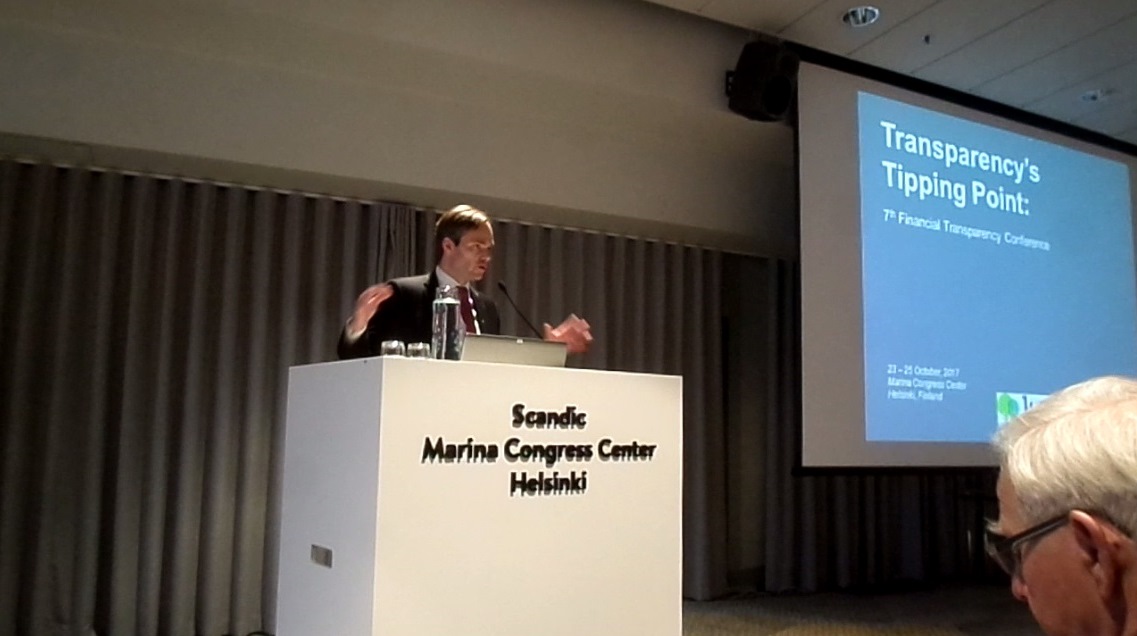From Jaston Binala in Helsinki, Finland.
Delegates attending a two-day conference on the fight against corruption, tax evasion and tax avoidance which ended in Helsinki, Finland on Wednesday, October 25, 2017 agreed after heated debate control of the menace of illicit financial flows in the world should become a United Nations agenda to succeed.
Opening the conference with the slogan ‘Transparency’s Tipping Point’ on Tuesday, October 24, 2017, Finland’s Minister of Trade and Development, Mr. Kai Mykkanen repeated the complaint often echoed by development stakeholders that illicit financial flows were stifling economic growth in many developing countries–particularly in Sub-Saharan Africa where an estimated USD 50 billion is drained out each year through tax evasion, tax avoidance and corruption.
“So, obviously, without tackling the issue of tax avoidance, tax evasion and tax collection, we are totally lost in any possibilities to solve the challenge of development,” the Minister said.
In the debates that followed the conference opening at Marina Conference Centre on the sides of Helsinki Port, the delegates from South America, Sub-Saharan Africa and Europe agreed victims of illicit financial flows would not succeed to finish this problem acting alone; the best way to deal with the problem would be to take it to the international stage as a UN agenda, they agreed.
The overriding idea in this approach pointed toward finding a solution that revolved around adopting pan-territorial legislation that makes illicit finance illegal and punishable across the globe. For this to happen, nations in the UN, including those currently known to be tax havens, would have to agree with the idea. In this way dirty money would not find anywhere to hide.
Tax havens are countries with extremely low taxes and legislation which permits banks to hide identities of their depositors.
Presenters at the Helsinki conference identified interim methods which should be used to combat illicit financial flows before large scale operations are adopted. Heather Lowe, Legal Counsel & Director of Government Affairs at Global Financial Integrity said one way to start ‘pulling strings’ would be to ask all tax jurisdictions to enforce a ban on secret ownership of companies, so that every beneficiary of a business entity should be known.
A document jointly published by Financial Transparency Coalition (FTC) and the Finish organization Kepa says: “When trillions of dollars flow through a shadow financial system beyond public scrutiny, citizens of rich and poor countries both lose. Northern Governments under pressure to stop illicit financial flows have been outspoken in communiqués and press releases, but 3 of the top 5 secrecy jurisdictions still lie in Europe and the US.”
The 7th Financial Transparency Conference held in Helsinki brought together civil society, government officials from both ‘The South and ‘The North’, journalists and policy experts to discuss the problem of illicit financial flows while brainstorming new ways to combat its effects on growth and development “in our respective countries.”
Over the past half century, the shadow financial system has grown more complex, and the tools to hide and move money undetected have proliferated,” the FTC/Kepa document says. Whether it’s through anonymous companies and tax havens, or simply through the lack of regular communication between authorities across borders, illicit financial flows—money that is illegally earned, transferred or utilized—now amounts to nearly one trillion dollars flowing out of developing countries each year, FTC and Kepa have said.





